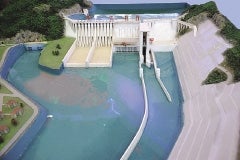A new study on the impact large-scale hydro and wind power imports could have on the Massachusetts energy market predicts significant savings for consumers, challenging the narrative put forward by critics of Gov. Charlie Baker’s energy bill that hydropower would be a costly alternative to natural gas.
The economic analysis, conducted for the Massachusetts Clean Energy Partnership by Power Advisory, concludes that energy customers in the state would see a net benefit of $171 million a year from long-term contracts for hydropower or a combination of hydro and land-based wind from northern New England or Canada.
The Clean Electricity Partnership is a coalition of regional wind, hydro and transmission companies working with business and environmental groups to promote clean energy.
The report, written by Power Advisory President John Dalton, suggests the savings generated by driving down demand for natural gas would not only cover the costs of building the transmission and facility infrastructure to import the power, but also deliver 10 percent of the carbon emission reductions required by 2050 under state law.
“Our analysis shows that displacing natural gas-fired electricity generation with hydropower or a combination of hydro and wind results in substantial annual savings to Massachusetts energy consumers as well as dramatic reductions in greenhouse gas emissions,” Dalton wrote.
The study presents a starkly different view of hydropower’s impact on price than that reported by a separate review produced for the New England Power Generators Association that predicted $777 million a year in costs for ratepayers, including the cost of building transmission lines from Canada through New England.
The NEPGA believes that the state’s energy needs would be best met by letting the market respond to the forthcoming retirements of an estimated 10,000 megawatts of power from Pilgrim Nuclear Power Station and other retiring power plants.
The new study comes a day after Kinder Morgan announced that it would suspend all work and spending on its Northeast Energy Direct natural gas pipeline project from New York to Dracut, Mass. That would have added natural gas capacity in the region.
“Frankly, I don’t think there was lots of analysis that underlied that report,” Dalton said of the NEPGA report.
The computer modeling used by Power Advisory assumed an expansion of natural gas pipelines in Massachusetts, as well as the addition of already proposed new natural gas power plants, but Dalton said the Kinder Morgan announcement does not significantly alter his predictions.
“We didn’t specifically assume it was Kinder Morgan,” Dalton told the News Service. “It could have been the Spectra project as well. But if neither get built the benefits would be all that much more compelling because as you’ll see in this analysis these clean energy imports act as another pipeline, a clean energy pipeline.”
Baker has proposed authorizing utilities to solicit bids for long-term power contracts to import between 1,200 and 2,400 megawatts of hydropower to Massachusetts. While Baker believes the clean energy resource will be able to offer a reliable source of energy at a competitive price, he has stressed that if the bids come back to high for consumers they would be rejected.
The new analysis concludes that hydro and wind power imports would drive down wholesale energy prices and reduce the use of less-efficient power plants, saving $440 million a year before incorporating the infrastructure costs needed to import the clean power.
Lower demand for natural gas would also create $160 million in savings for natural gas customers who use the resource for heat and cooking, the study concluded.
The House is expected to release major energy policy legislation as soon as next month that is likely to address the idea of competitive procurement of both hydro and off-shore wind as a clean energy solution to meeting the region’s energy needs as sources such as Pilgrim Nuclear Power Station prepare to come offline.
Over a 25-year period, Dalton’s report estimates $603 million in savings a year in Massachusetts from the importation of Canadian hydropower before the cost of transmission lines and facilities are factored.
The volume of energy from the new renewable resources would drive down demand for natural gas and reduce the price of gas used to produce electricity on peak demand days. The result would be savings of approximately $219 million a year for Massachusetts customers, he wrote.

